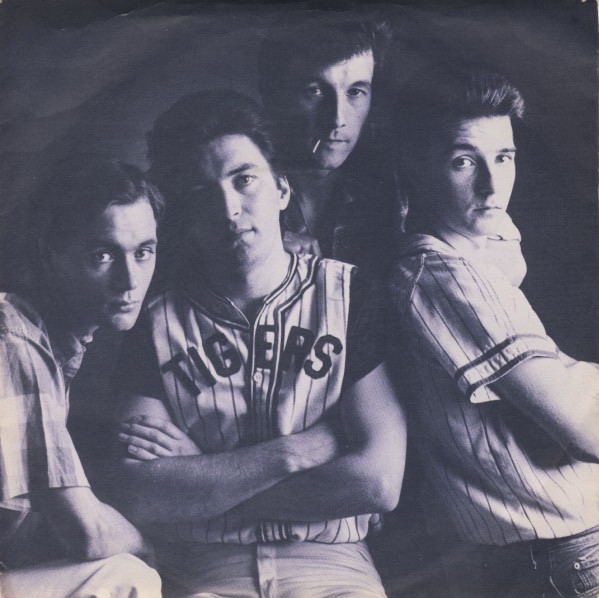
The Intro
Here is surely one of the strangest and most obscure number 1s of the 70s, perhaps of all time. Before his solo career, before Band Aid, before Ultravox, Midge Ure was in a group called Slik, who briefly lorded it over the charts with a bizarre mix of Gothic horror and Bay City Rollers-style pop.
Before
Slik started out as Glasgow-based heavy-rock band Salvation in 1970. The original line-up featured the McGinlay brothers, Kevin and Jim, Nod Kerr, Mario Tortolano, and Ian Kenny. The line-up changed several times but stabilised in 1972 with Kevin on vocals, Jim on bass, Kenny Hyslop on drums, Billy McIsaac on keyboards and Jim Ure on guitar. In a bid to avoid the confusion of having two Jims in the band, their bassist suggested Ure say his backwards, and he became ‘Mij’, which in time became ‘Midge’, and stuck for the rest of his life. They became the house band at Glasgow discothèque Clouds, where they would perform cover versions.
In April 1974 Kevin McGinlay left Salvation to pursue a solo career. Ure assumed singing duties while remaining as guitarist. That November they became Slik. They signed with Polydor and adopted pseudonyms – Ure was already Midge, Hyslop became Oil Slik, McGinlay was Jim Slik and McIsaac was now Lord Slik. Slik suited up to live up to their name, and ditched glam rock to work with pop songwriters Bill Martin and Phil Coulter. Together the duo had scored three number 1s over the years with Sandie Shaw, Cliff Richard and the England 1970 World Cup squad. Their most recent group to benefit from their skills was the Bay City Rollers, and very well they were doing too.
Slik didn’t initially have the same success. Debut single Boogiest Band in Town on Polydor in 1975 got nowhere. So they ditched the suits and, for some reason, swapped them for baseball shirts, probably to try and break the US. They also signed with Bell Records. Interestingly, Ure has claimed in the past that he was approached by Malcolm McClaren to be the singer of the Sex Pistols.
This isn’t Demis Roussos’ Forever and Ever, which would come later in the year. Slik’s song had originally been released by the pop group Kenny earlier that year on their album The Sound of Super K. It’s worth noting that their version is almost as odd as Slik’s, it just isn’t as well produced and is lacking bounce. Unlike their hit The Bump.
Review
I can still recall the first time I saw this on a BBC Four repeat of Top of the Pops. It blew my mind. Who the hell decided the opening section should insinuate we were about to hear some proggy, concept single or Black sabbath style metal obscurity? Considering Kenny and Slik’s version starts the same way, it must have been Martin and Coulter’s idea. It had me on the edge of my seat. I thought I was about to be treated to a forgotten surreal masterpiece. How the hell did this get to number 1? And is that really Midge Ure singing it? Thinking about it though, did this idea of an atmospheric opening help inspire Vienna?
Once the verses switch to the chorus, it becomes apparent how it got to number 1. It sounds like a Bay City Rollers reject, and it was. I’m all for schizophrenic singles, but the transition here is far from seamless, and although the chorus is catchy, as soon as it begins, my interest dissipates until the next verse. But I am an awkward sod. If I was whoever Ure is singing to here, I’d stay well away. He’s clearly assumed the role of a schizophrenic.
After
Slik, Martin and Coulter tried to repeat their surprise success with the follow-up Requiem, but only got to 24. This wasn’t helped by Ure being injured in a car accident which forced the band to cancel promotional appearances. Their eponymous LP soon followed, but didn’t even dent the top 40. In March 1977 Jim McGinlay left to be replaced by Russell Webb for Slik’s final tour dates. Desperate to ride the next musical wave, they changed their name to PVC2 and became a punk band. Only one single was released though, Ure’s Put You in the Picture, and it didn’t chart. They split up that September, with Ure joining The Rich Kids, former Sex Pistol Glen Matlock’s new band. More on them when we get to Ultravox.
As for the rest of Slik, Webb, Hyslop and McIsaac added Alex Harvey’s cousin Willie Gardner to their group and became Zones. They made one album, Under Influence, released in 1979, but they then split. Webb and Hyslop joined The Skids. McIsaac left the music business but made a return in the 90s with the Billy McIsaac Band.
The Outro
Weirdly, this is the first of two songs called Forever and Ever to reach number 1 in 1976, as Demi Roussos achieved the same accolade when an EP featuring his song topped the charts that summer.
The Info
Written & produced by
Bill Martin & Phil Coulter
Weeks at number 1
1 (14-20 February)
Trivia
Births
20 February: The Darkness drummer Ed Graham
Meanwhile…
19 February: Iceland breaks off diplomatic relations with the UK over the Cod War.